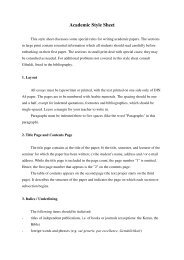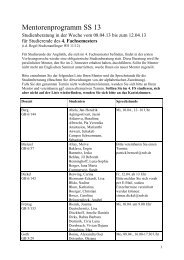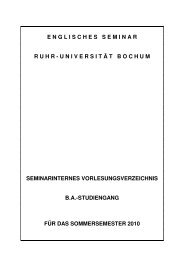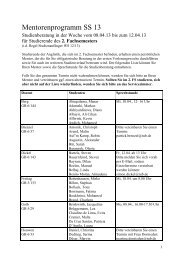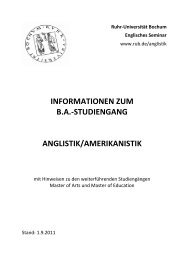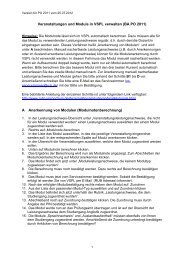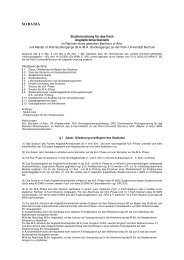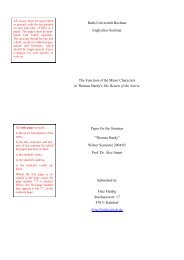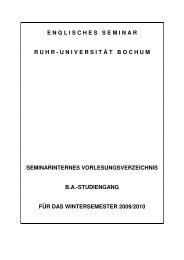Englisches Seminar - Ruhr-Universität Bochum
Englisches Seminar - Ruhr-Universität Bochum
Englisches Seminar - Ruhr-Universität Bochum
You also want an ePaper? Increase the reach of your titles
YUMPU automatically turns print PDFs into web optimized ePapers that Google loves.
This course takes place as a block seminar. There will be an obligatory<br />
preparatory meeting on April 08, 2013, 8.30 - 10.00, which students must attend, as<br />
we will discuss the course outline and assign presentations on that day. Students<br />
also must have read the individual texts on the readings list before the block seminar.<br />
There will be a brief test on the first day of the block seminar to ensure that<br />
participants have done so. Please note that you will not be allowed to participate in<br />
the seminar, if you fail to attend the preparatory meeting or to document that you<br />
have read the texts.<br />
Assessment/requirements: Übung: regular active participation (this will include<br />
regular reading and, possibly, data analyses at home) and a contribution to an inclass<br />
group presentation (with handout, data collection, and literature reviews);<br />
<strong>Seminar</strong>: the above, and an empirical term paper (15-18 pages). For students taking<br />
the course to cover the exam module: annotated bibliography of 10 titles related to<br />
the course topic; three paper summaries.<br />
Übung<br />
050 710 Müller, T.<br />
Grammaticalisation, 3 CP<br />
2 st. mi 12-14 GABF 04/613 Süd<br />
One of the classic views of functional linguistics is expressed in Talmy Givón’s<br />
famous formula ‘Today’s morphology is yesterday’s syntax.’ Yet the view that<br />
grammatical categories evolve out of lexical ones goes back at least to Wilhelm von<br />
Humboldt in the early 19 th century. This view implies that grammar is not a static,<br />
seemingly random set of rules but that it is constantly changing and developing new<br />
forms. So, reformulating Givón, the grammar of the future is shaped by the pragmatic<br />
discourse strategies of today.<br />
This class will address questions such as (and will attempt to answer them):<br />
‐ How does the grammar of a language come about?<br />
‐ Does language change always involve grammaticalisation?<br />
‐ When does “pragmatic inference” become “semantic meaning”?<br />
‐ Can we predict language change?<br />
‐ Can we predict which words will end up as grammatical markers?<br />
‐ Do all languages go through the same evolutionary stages?<br />
‐ Where are the boundaries of grammaticalisation, especially with regard to<br />
related processes such as lexicalisation, re-analysis and analogy?<br />
Assessment/requirements: active participation, reading assignments and homework,<br />
final test.



